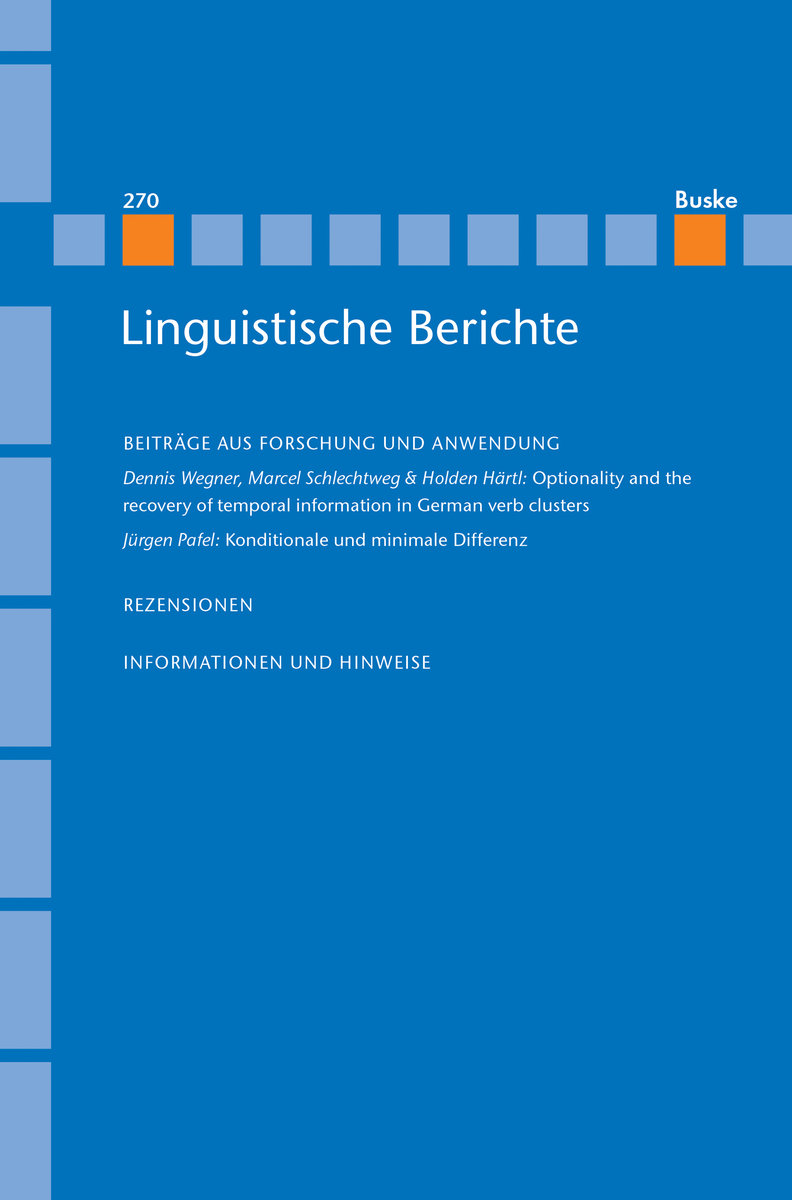Abstracts
Wegner, Dennis, Härtl, Holden, Schlechtweg, Marcel: Optionality and the recovery of temporal information in German verb clusters.
While the clause-final placement of finite elements is usually quite rigid in German embedded clauses, verbal clusters mark an exception in that they allow finite temporal auxiliaries to be placed linearly before the verbal elements they embed. The prescriptive rules of Standard German suggest that there is optionality with respect to the two ordering possibilities at least in future clauses. However, previous studies have shown that this also holds for perfect clauses with lassen ('let'). Based on two experimental studies focussing on verbal clusters with continuative lassen ('let') and perception verbs, which supposedly have similar properties, the present paper aims at investigating a) whether there really is proper optionality with respect to placing the finite auxiliary in a cluster-initial or clause-final position, and b) whether preposing the temporal auxiliary induces advantages for the processing of temporal information.
Pafel, Jürgen: Konditionale und minimale Differenz.
Counterfactuals invite us to imagine a course of the world in which certain state-of-affairs obtain which might be contrary to fact, but which is otherwise identical to the real course of the world. They invite us to imagine a minimal different course of the world. Minimal difference is an essential ingredient of many, perhaps most, semantic accounts of counterfactuals. They differ in the way they conceptualize minimal difference. I present a definition of 'minimal different course of the world' after discussing many scenarios in detail, with respect to which certain counterfactuals are supposed to be true or false. Minimal difference means that, as for a 'counterfactual' course of the world, everything is as it actually is except that (i) the counterfactual's antecedent is true and (ii) state-of-affair obtain which are possible in virtue of (i) and the regularities of the world. With this background, the truth condition of a counterfactual can be stated as follows: It is true if the consequent is true in every course of the world in which the antecedent is true, and which is minimal different from the actual course of the world. This kind of truth condition is argued to be adequate for singular indicative conditionals too. Various problems concerning this extension are discussed. A closer look at the pragmatics of counterfactuals exhibits a variety of different 'implications', whose status is partially unclear. Finally, I discuss the prospects of extending the minimal-difference semantics of conditionals to causals.
Bauer, Anastasia: Rezension: Vadim Kimmelman (2019): Information structure in sign languages. Evidence from Russian Sign Language and Sign Language of the Netherlands. Berlin: De Gruyter and Ishara Press.
Krstic, Vladimir: Rezension: Meibauer, Jörg (ed.) (2019): The Oxford handbook of lying. Oxford: Oxford University Press.
Tsiknakis, Antonios: Rezension: Sonja Müller (2019): Die Syntax-Pragmatik-Schnittstelle. Ein Studienbuch. Tübingen: Narr Francke Attempto.
Klaus, Müllner: Informationen und Hinweise.



